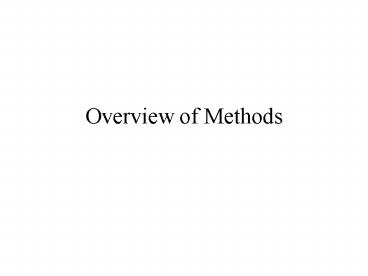Overview of Methods PowerPoint PPT Presentation
1 / 17
Title: Overview of Methods
1
Overview of Methods
2
Objectives
- Understand two approaches to research
- Understand types and properties of research
strategies
3
(False?) Dichotomies
4
The Focus Dichotomy
- Problem focused
- Find a problem (e.g., violence, poor decision
making, marital conflict, stereotyping) - Look at it (find sources of problem often
qualitative approach) - Look at theories that might be relevant
- Test adequacy of theories/actions taken
- Predictive power
- Mediating and moderating variables
- Effect of interventions
5
Theory Focused
- Have theory
- Look for tests (comparisons with chance, with
other theories) to validate theoretical
propositions (mediators) - Look for better, cheaper measures of constructs
- Look for boundary conditions (moderators)
- Look for phenomenon explained by theory (increase
comprehensiveness/generalizability of theory) - At some point, this is the end game (i.e., X is a
problem of type Y, therefore theory Z can be
applied to make W prediction or V invention AND
WE DO NOT NEED TO CONFIRM THAT W HAPPENED OR THAT
V WAS EFFECTIVE)
6
(No Transcript)
7
Tradeoffs and Triangulation
- Think program of research
- No single study will answer a question
- but it should take a reasonable swipe at an
aspect of the question - No single design will address a problem
- The greater your repertoire, the more you can do
to promote your brainchild - Others are, or have, worked on related problems
- review the literature
- For any particular study, design depends on
purpose!
8
Research Strategies
- Taxonomies of methods
- Experimental/correlational/case
- Runkel McGrath
- Properties
- Obtrusiveness
- Universal to particular
- Control (precision)
- Realism
- Validities (internal/external/construct/statistica
l conclusion) - ?
9
Quasi-experiment (equivalent groups)
10
Behaviors
Observations
11
Control Over Relevant Variables (Experimental V.
Subject)
- Three choices
- ______________
- Control group v. Experimental group (treatment
group) - Drug dosage (none, 5mg, 10mg, 15mg)
- Placebo training v. Training program you are
testing - Defining quality of experiment (mode X)
12
Control Over Variables (2rd)
- _____________
- Exclusion
- Equalization based on measurement
- But what is relevant?
- Can you really measure, exclude or equalize all?
- If equalizing, does it reflect natural
distribution? Is measurement perfect? - So how do we assure the variables are controlled?
- Randomization!
13
Control Over Variables (3rd)
- ____________________
- Defn randomly assigned to the various levels of
the independent variable. - For some, defining quality of experiment.
- Not the same as random selection (random
sampling). - Assures proportionally equalizing all variables
except the manipulated variable. - Sample must be large enough (consider sample of
2) or enough experiments. - Thus, we are not confounding manipulated variable
with some other(s) relevant variable(s).
14
Problems with __________________________
15
Other Methods
- Case
- Idiographic issue (next slide)
- Evaluation
- Just field experiment
- Tend to throw in kitchen sink, so lots of
confounds - Action research
- Really describes science nicely (circular)
16
Idiothetic
- Combination of nomothetic and idiographic
- Nomothetic
- General principles that apply to most/all
- Justifies averaging?
- Idiographic
- Specific case (clinical)
- Particularistic (v. universal) research?
- Testing specimen v. casting nets
- Modal theories v. theories of individual
differences
17
Next class
- Project
- Think about research area that interests you and
come up with three (3) research questions related
to it.

